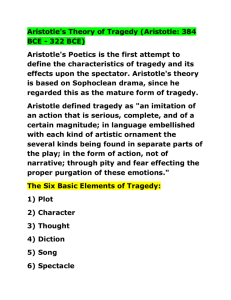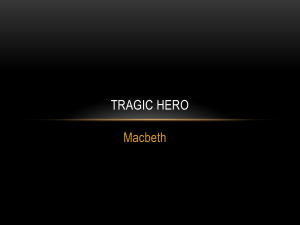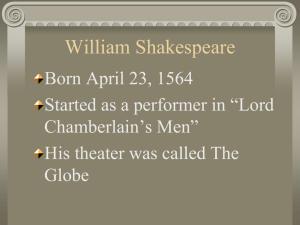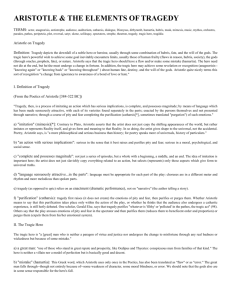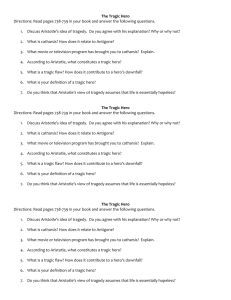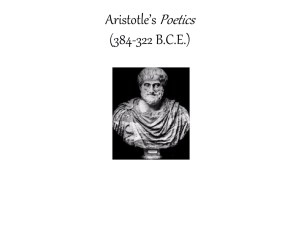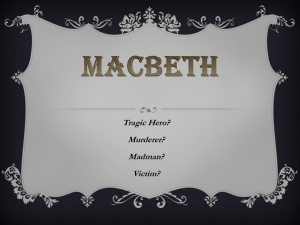Aristotle`s Defintion of Tragedy
advertisement
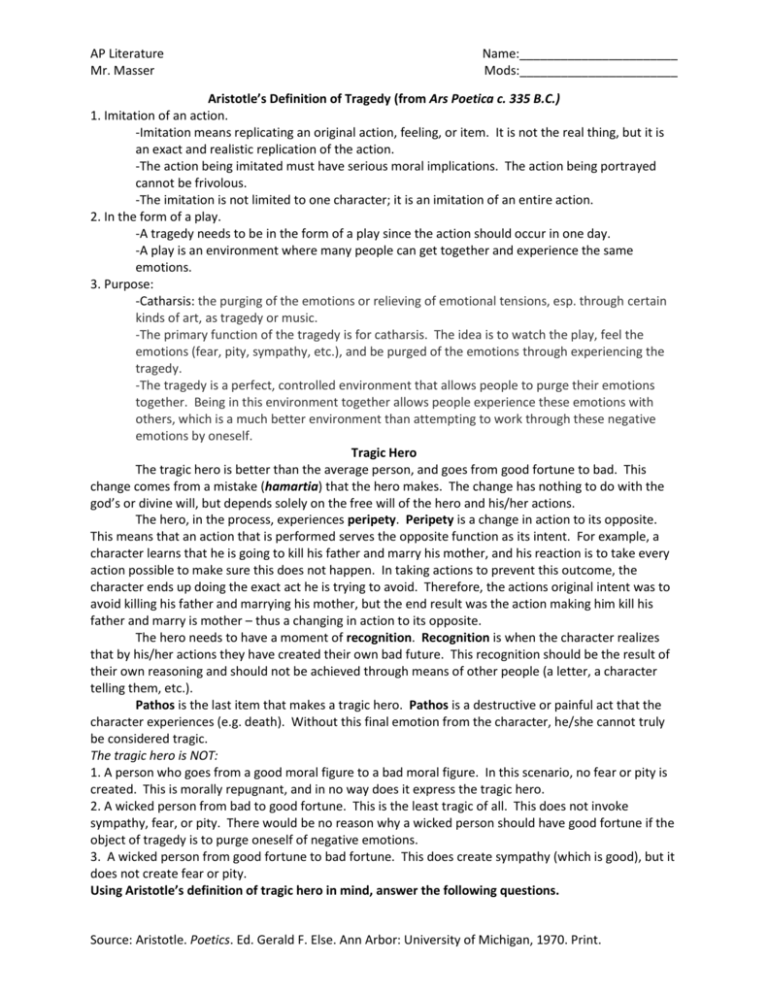
AP Literature Mr. Masser Name:_______________________ Mods:_______________________ Aristotle’s Definition of Tragedy (from Ars Poetica c. 335 B.C.) 1. Imitation of an action. -Imitation means replicating an original action, feeling, or item. It is not the real thing, but it is an exact and realistic replication of the action. -The action being imitated must have serious moral implications. The action being portrayed cannot be frivolous. -The imitation is not limited to one character; it is an imitation of an entire action. 2. In the form of a play. -A tragedy needs to be in the form of a play since the action should occur in one day. -A play is an environment where many people can get together and experience the same emotions. 3. Purpose: -Catharsis: the purging of the emotions or relieving of emotional tensions, esp. through certain kinds of art, as tragedy or music. -The primary function of the tragedy is for catharsis. The idea is to watch the play, feel the emotions (fear, pity, sympathy, etc.), and be purged of the emotions through experiencing the tragedy. -The tragedy is a perfect, controlled environment that allows people to purge their emotions together. Being in this environment together allows people experience these emotions with others, which is a much better environment than attempting to work through these negative emotions by oneself. Tragic Hero The tragic hero is better than the average person, and goes from good fortune to bad. This change comes from a mistake (hamartia) that the hero makes. The change has nothing to do with the god’s or divine will, but depends solely on the free will of the hero and his/her actions. The hero, in the process, experiences peripety. Peripety is a change in action to its opposite. This means that an action that is performed serves the opposite function as its intent. For example, a character learns that he is going to kill his father and marry his mother, and his reaction is to take every action possible to make sure this does not happen. In taking actions to prevent this outcome, the character ends up doing the exact act he is trying to avoid. Therefore, the actions original intent was to avoid killing his father and marrying his mother, but the end result was the action making him kill his father and marry is mother – thus a changing in action to its opposite. The hero needs to have a moment of recognition. Recognition is when the character realizes that by his/her actions they have created their own bad future. This recognition should be the result of their own reasoning and should not be achieved through means of other people (a letter, a character telling them, etc.). Pathos is the last item that makes a tragic hero. Pathos is a destructive or painful act that the character experiences (e.g. death). Without this final emotion from the character, he/she cannot truly be considered tragic. The tragic hero is NOT: 1. A person who goes from a good moral figure to a bad moral figure. In this scenario, no fear or pity is created. This is morally repugnant, and in no way does it express the tragic hero. 2. A wicked person from bad to good fortune. This is the least tragic of all. This does not invoke sympathy, fear, or pity. There would be no reason why a wicked person should have good fortune if the object of tragedy is to purge oneself of negative emotions. 3. A wicked person from good fortune to bad fortune. This does create sympathy (which is good), but it does not create fear or pity. Using Aristotle’s definition of tragic hero in mind, answer the following questions. Source: Aristotle. Poetics. Ed. Gerald F. Else. Ann Arbor: University of Michigan, 1970. Print. AP Literature Mr. Masser Name:_______________________ Mods:_______________________ 1. Who is the tragic hero of the play? Explain why he is better than the average person. Provide a quote to support your point. How does Shakespeare take liberties with this element of Aristotle’s definition? 2. Name the hamartia (mistake) the character experienced. Make sure to include how this action was a result of the character’s free will. Provide a quote to support your point. How does Shakespeare take liberties with this element of Aristotle’s definition? 3. Explain how this character experiences peripety. What does this character do that would fall into this category? Provide a quote to support your point. How does Shakespeare take liberties with this element of Aristotle’s definition? 4. Explain what the recognition that character experiences. How was this a result of their own reason? Provide a quote to support your point. How does Shakespeare take liberties with this element of Aristotle’s definition? 5. Explain the pathos the character experiences. What happens to this character and how does that add to the tragedy? Provide a quote to support your point. How does Shakespeare take liberties with this element of Aristotle’s definition? Source: Aristotle. Poetics. Ed. Gerald F. Else. Ann Arbor: University of Michigan, 1970. Print. AP Literature Mr. Masser Name:_______________________ Mods:_______________________ 6. While he is certainly the conquering hero, why is Macduff not the tragic hero of this play? 7. Why do you think Shakespeare takes so many liberties with Aristotle’s definition of tragedy and his hero in Macbeth? Are there themes otherwise present in the play which these liberties seem to support? 8. What would be the political implications of this tragedy to Shakespeare’s audience in 1606? Could any of the liberties Shakespeare takes with Aristotle’s definition of tragedy be relevant to the political situation in England of that time? (Refer to Background/History Power Point notes.) Source: Aristotle. Poetics. Ed. Gerald F. Else. Ann Arbor: University of Michigan, 1970. Print.

